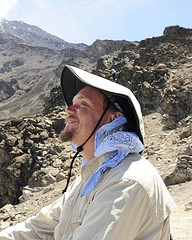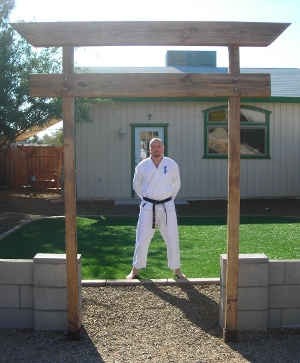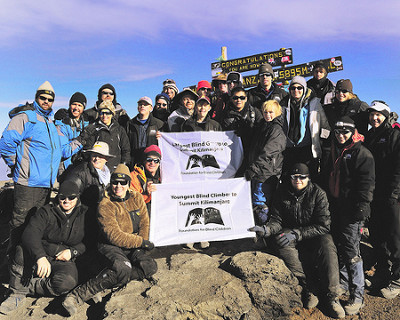 I would like to tell you a bit about myself and how I have adapted to the loss of my eyesight. My name is Mike Armstrong and I am totally blind, but I am also a Karate teacher, professional drummer, husband, father, published author, public speaker, and a world class mountaineer. On June twenty-ninth 2009, I stood at the highest point in Africa with twenty-four of my best friends, seven of which were blind. This was one of the most amazing experiences of my life. I learned more about myself in those eight days on Mount Kilimanjaro than I had in the eight years prior to the loss of my eyesight. Today I want to give you an idea of how I see life as a blind man.
I would like to tell you a bit about myself and how I have adapted to the loss of my eyesight. My name is Mike Armstrong and I am totally blind, but I am also a Karate teacher, professional drummer, husband, father, published author, public speaker, and a world class mountaineer. On June twenty-ninth 2009, I stood at the highest point in Africa with twenty-four of my best friends, seven of which were blind. This was one of the most amazing experiences of my life. I learned more about myself in those eight days on Mount Kilimanjaro than I had in the eight years prior to the loss of my eyesight. Today I want to give you an idea of how I see life as a blind man.
I lost my eyesight in October of nineteen-ninety-six. It was due to a disease that made my retinas very susceptible to tearing. I had known about this eye problem for ten years, but did not ever think that it would take my sight. At the age of twenty-two I lost the vision in my right eye. At this point my doctor warned me that if I did not give up all contact sports especially the Martial Arts I could go totally blind. To be fair I tried to stop training in Karate and Jujitsu for about three months, but it sent me into such a bout of depression that I knew I would not be happy with out it. I tried my best to mellow out my art. I cut back on my sparring. I did not take as many falls in Judo, all to no avail. In October of 1996 my doctor found a tear in my left eye. He told me that I would eventually go blind if I did not have a surgery to repair it. We went a head and scheduled the procedure for three days later.
I remember the night before my surgery I went out side to watch what could be my last sunset. Arizona is well known for the amazing beauty of our sunsets. At first I spent about ten minutes appreciating the view and was about to come in the house when I realized that this might be the last time I experience this wonder. I stopped right there and for the first time in my life I made looking at the beauty of our world my priority. Well that was the last time I was given that privilege. I truly thank God for the insight that led and kept me outside that night. Those colors are still vivid in my mind today.
 After the loss of my sight I had to learn how to do almost everything all over again. It was a bit daunting at first, but every time I picked up a new skill I felt as if I regained a bit more of my life back. It took me about six months before I felt like I was independent.
After the loss of my sight I had to learn how to do almost everything all over again. It was a bit daunting at first, but every time I picked up a new skill I felt as if I regained a bit more of my life back. It took me about six months before I felt like I was independent.
The problem facing me at that point was where to work. I floundered for a while. What kind of job should a blind man do? Prior to going blind I was a Garage Door Installer and I also worked for Home Depot. Although those jobs were not impossible for me to do, I felt that they were not very practical.
Then it dawned on me that my passions can be my profession. When I could see all I wanted to be able to do was to play drums and train in martial arts. I have never given up on becoming a professional musician, but I did not make a living at it. I was still teaching martial arts, but only on a small scale. So I took a chance and started my own commercial Karate school (Blind Tiger Martial Arts Academy). I believe that opening my own school was one of the best decisions of my life. It was not easy, but most things give us value because of how hard we had to work for them.
Not only do I love being my own boss, but if it wasn’t for my school I would not have met my wife Tori, climbed Mount Kilimanjaro or become an inspirational speaker.
Tori and I have three wonderful children Shayla, Justin and Jadyn. Children open up an entirely different part of your hart. I can’t imagine my life without my family. Being a father is an adventure in and of its self.
It is kind of interesting how my being a Martial Arts Instructor led to my climbing Kilimanjaro. I started taking classes at the Foundation for Blind Children to help me run my business. After graduating from their program I started to teach self defense workshops to their clients.
After one of these classes I was approached by the director of the Adult Services program Cindy Ross. She asked me if I wanted to be a part of a group of visually impaired people to climb Kilimanjaro the tallest mountain in Africa. This would be a fundraising/awareness hike-a-thon for the Foundation for Blind Children. My first thought was are you crazy, but as I thought about the adventure of it, I knew I was in. I told her that I was extremely interested, but I wanted to talk to my family before I committed. You see, several people die attempting to climb Kilimanjaro each year and I wanted to make sure that my family was on board with this decision.
When I brought up the idea to Tori, she was very supportive. Of course she was a bit concerned about the dangers involved in mountain climbing, but she had faith in me. My kids thought that it was wicked awesome. I immediately called Cindy back at the FBC and let her know that I was in.
One thing that I had to figure out was how to hike. I had been an avid hiker when I could see; however the first time I tried to hike blind was a complete failure. I attempted a hike with one of my friends through the Superstition Mountains with a cane. I lasted about fifteen minutes before I decided to turn back. I think that day I was falling more than I was walking. A few years later I heard about Eric Weihenmeyer and how he climbed Mount Everest. I then read his book about his climb of Mount Hood. It inspired me to start hiking again, but there was always something else that took precedence over hiking. When I found out that our expedition leader Kevin Cherilla was a part of Eric’s Everest team, I was excited to get started.
We spent one year training for Kilimanjaro. We all developed different methods of hiking. Each blind climber had two sighted guides. The technique I use involves a guide in front of me ringing a bear bell. I follow the sound and use a set of trekking poles to make sure of my footing. My team consists of Greg DePinto, Ben Cane (one of my students), and myself. I figure we hiked over three hundred miles prior to Kili. It was a lot of work, but Kevin prepared us well and we were ready. Then on June 29th we stood on the top of Africa, Mount Kilimanjaro 19,340 feet.
I believe that anything is possible with the proper training and desire. We all have challenges in life, but how we approach them is truly what defines us. Blindness really sucks at times, but I will never let it stop me from living a truly full life. When I speak to people about some of my experiences I pray that they see that there is always a way to appreciate life. Even though my life challenges me on a daily basis I do my best to look at it as an adventure instead of a hardship.
God Bless,
Mike Armstrong Shihan,
